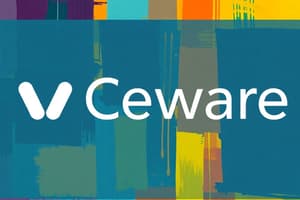Podcast
Questions and Answers
What is the primary purpose of SSL/TLS certificates in vCenter Server 5.2?
What is the primary purpose of SSL/TLS certificates in vCenter Server 5.2?
- To limit access to local resources
- To encrypt physical storage devices
- To enhance the graphical user interface
- To ensure secure communication between various components (correct)
Which component is responsible for issuing and managing digital certificates?
Which component is responsible for issuing and managing digital certificates?
- Certificate Authority (CA) (correct)
- Private Key
- Intermediate Certificates
- Certificate Store
What is the role of intermediate certificates in vCenter Server certificate management?
What is the role of intermediate certificates in vCenter Server certificate management?
- They are not crucial for secure communications
- They represent the private keys associated with certificates
- They link the server's certificate to the root CA (correct)
- They are used to store certificates permanently
Why is certificate renewal important in vCenter Server?
Why is certificate renewal important in vCenter Server?
What does certificate revocation ensure in vCenter Server certificate management?
What does certificate revocation ensure in vCenter Server certificate management?
What is the primary mode of connection for vCenter Server 5.2?
What is the primary mode of connection for vCenter Server 5.2?
Which task involves importing certificates to trust specific external entities?
Which task involves importing certificates to trust specific external entities?
What do certificate stores in vCenter Server primarily function as?
What do certificate stores in vCenter Server primarily function as?
How does HTTPS secure communication in vCenter Server 5.2?
How does HTTPS secure communication in vCenter Server 5.2?
Which type of key is required for the encryption and decryption process in certificate management?
Which type of key is required for the encryption and decryption process in certificate management?
What is a key reason for using external Certificate Authorities in production environments?
What is a key reason for using external Certificate Authorities in production environments?
Which practice is vital for ensuring the security of private keys?
Which practice is vital for ensuring the security of private keys?
What does robust logging for certificate errors help with?
What does robust logging for certificate errors help with?
What is a drawback of using vCenter Server 5.2 for certificate validation?
What is a drawback of using vCenter Server 5.2 for certificate validation?
What should be regularly checked to maintain certificate security?
What should be regularly checked to maintain certificate security?
Which of the following is NOT a limitation related to certificate management in vCenter Server?
Which of the following is NOT a limitation related to certificate management in vCenter Server?
How does the ESXi host communicate with the vCenter Server?
How does the ESXi host communicate with the vCenter Server?
What is an essential aspect of effective certificate management for vCenter Server?
What is an essential aspect of effective certificate management for vCenter Server?
Which of the following is a critical task relating to certificate management?
Which of the following is a critical task relating to certificate management?
What can poor certificate management lead to?
What can poor certificate management lead to?
What is primarily verified by the Certificate Authority (CA) when processing a certificate request?
What is primarily verified by the Certificate Authority (CA) when processing a certificate request?
Which component is essential for preventing the misuse of compromised certificates?
Which component is essential for preventing the misuse of compromised certificates?
What is the role of the secure repository in certificate management?
What is the role of the secure repository in certificate management?
During certificate renewal, which part of the original certificate is typically retained?
During certificate renewal, which part of the original certificate is typically retained?
Which protocol is commonly used by vcf 5.2 to check the status of an issued certificate?
Which protocol is commonly used by vcf 5.2 to check the status of an issued certificate?
What is a critical step in managing the certificate lifecycle?
What is a critical step in managing the certificate lifecycle?
Which phase follows the successful validation of a certificate request by the Certificate Authority?
Which phase follows the successful validation of a certificate request by the Certificate Authority?
What should be emphasized when configuring vcf 5.2 components for certificate usage?
What should be emphasized when configuring vcf 5.2 components for certificate usage?
What aspect is vital to maintain the trust and security of the vcf 5.2 system?
What aspect is vital to maintain the trust and security of the vcf 5.2 system?
What is a primary security concern in certificate management?
What is a primary security concern in certificate management?
Why is it important to regularly review the certificate management process?
Why is it important to regularly review the certificate management process?
What is a critical step in managing expired certificates?
What is a critical step in managing expired certificates?
How should certificates be protected to maintain their integrity?
How should certificates be protected to maintain their integrity?
What is a common issue that may arise with certificates?
What is a common issue that may arise with certificates?
Which practice is essential to adhere to relevant security standards in certificate management?
Which practice is essential to adhere to relevant security standards in certificate management?
What is essential for secure communication between vcf 5.2 components?
What is essential for secure communication between vcf 5.2 components?
What should be done when a certificate is found to be invalid?
What should be done when a certificate is found to be invalid?
Which aspect is crucial during the configuration process of certificates?
Which aspect is crucial during the configuration process of certificates?
What is a vital component of managing the lifecycle of certificates?
What is a vital component of managing the lifecycle of certificates?
Flashcards
What is Certificate Management in vCenter Server 5.2?
What is Certificate Management in vCenter Server 5.2?
Managing SSL/TLS certificates to secure communication between vCenter Server, the vSphere Client and ESXi Hosts.
What is a Certificate?
What is a Certificate?
A digital document containing information about the owner, including name, organizational details, and the public key.
What is a Certificate Authority (CA)?
What is a Certificate Authority (CA)?
A trusted entity that issues and manages digital certificates.
What is a Private Key?
What is a Private Key?
Signup and view all the flashcards
What is an Intermediate Certificate?
What is an Intermediate Certificate?
Signup and view all the flashcards
What is a Certificate Store?
What is a Certificate Store?
Signup and view all the flashcards
Why is Certificate Installation important?
Why is Certificate Installation important?
Signup and view all the flashcards
Why is Certificate Renewal important?
Why is Certificate Renewal important?
Signup and view all the flashcards
What is Certificate Validation?
What is Certificate Validation?
Signup and view all the flashcards
What is Certificate Revocation?
What is Certificate Revocation?
Signup and view all the flashcards
SSL Certificate Errors
SSL Certificate Errors
Signup and view all the flashcards
Private Key Security
Private Key Security
Signup and view all the flashcards
Certificate Expiration
Certificate Expiration
Signup and view all the flashcards
Automated Certificate Management
Automated Certificate Management
Signup and view all the flashcards
vCenter Server Communication
vCenter Server Communication
Signup and view all the flashcards
External Certificate Authority (CA)
External Certificate Authority (CA)
Signup and view all the flashcards
Self-Signed Certificate
Self-Signed Certificate
Signup and view all the flashcards
Certificate Validation
Certificate Validation
Signup and view all the flashcards
Certificate Management Best Practices
Certificate Management Best Practices
Signup and view all the flashcards
Security Vulnerability
Security Vulnerability
Signup and view all the flashcards
What is Certificate Management?
What is Certificate Management?
Signup and view all the flashcards
Certificate Lifecycle
Certificate Lifecycle
Signup and view all the flashcards
Certificate Requests and Issuance
Certificate Requests and Issuance
Signup and view all the flashcards
Certificate Storage and Management
Certificate Storage and Management
Signup and view all the flashcards
Certificate Renewal
Certificate Renewal
Signup and view all the flashcards
Certificate Revocation
Certificate Revocation
Signup and view all the flashcards
Certificate Deployment
Certificate Deployment
Signup and view all the flashcards
Certificate Management's Role
Certificate Management's Role
Signup and view all the flashcards
Certificate Issues
Certificate Issues
Signup and view all the flashcards
Certificate Security Concerns
Certificate Security Concerns
Signup and view all the flashcards
Certificate Interaction with vCenter Components
Certificate Interaction with vCenter Components
Signup and view all the flashcards
Importance of Compliance
Importance of Compliance
Signup and view all the flashcards
Certificate Lifecycle Management
Certificate Lifecycle Management
Signup and view all the flashcards
Regular Review of Certificate Management
Regular Review of Certificate Management
Signup and view all the flashcards
Certificate Encryption
Certificate Encryption
Signup and view all the flashcards
Certificate Access Control
Certificate Access Control
Signup and view all the flashcards
Study Notes
Introduction
- Certificate management in vCenter Server 5.2 (vcf 5.2) is a structured process for handling digital certificates used for secure communication and authentication.
- Maintaining trust and security in the vcf 5.2 system is crucial.
- Secure deployments depend on proper certificate management.
Key Certificate Components
- Certificates: Digital certificates identify owners (name, details, public key), essential for secure communication.
- Certificate Authority (CA): A trusted entity issues certificates; vCenter uses external trusted CAs.
- Private Keys: Cryptographic keys paired with public keys, crucial for encryption/decryption; secure storage is mandatory.
- Intermediate Certificates: Link the vCenter Server certificate to the root CA forming the certificate chain.
- Certificate Stores: Locations for managing certificates within the vCenter Server system.
Certificate Management Tasks
- Certificate Installation: Installing certificates on vCenter Server and ESXi hosts establishes secure communication channels.
- Certificate Renewal: Certificates expire; renewal is essential to maintain secure connections.
- Certificate Validation: Confirming certificate validity to prevent expired or invalid certificates, crucial for proper security.
- Certificate Revocation: Immediate revocation of compromised or invalid certificates is critical.
- Certificate Import: Importing certificates for trusted external entities (e.g., vendor-specific certificates).
- Certificate Export: Exporting certificates for recovery or offsite storage.
- Configuring Certificate-Based Authentication: Possible, but less common in vCenter Server 5.2; primarily uses username/password.
- HTTPS Configuration: HTTPS forms the foundation of secure communication, relying on certificates.
- Troubleshooting Certificate Errors: Identifying and resolving certificate-related issues, like invalid certificates (common SSL errors).
- Certificate Requests and Issuance: The process of requesting and obtaining a certificate from a trusted CA.
- Certificate Storage and Management: Secure storage and retrieval of certificates, along with procedures to maintain trust and validity.
Best Practices
- Secure Storage of Private Keys: Securely store private keys, preventing exposure in configuration files.
- Regular Certificate Checks: Routine checks for certificate expiration and validity.
- Automated Certificate Management: Tools and scripts automate tasks like renewal notifications and certificate installation.
- Robust Logging for Certificate Errors: Set up logging on vCenter and ESXi components to diagnose issues.
- Compliance with Security Standards: Adhering to relevant security regulations.
- Regular Review of the Process: Periodic evaluation for vulnerabilities and weaknesses in the certificate management system.
External Certificate Sources
- External Certificate Authorities: Using trusted external CAs for production environments is more secure than self-signed certificates.
- Certificates from Third-Party Solutions: Integrating certificates from other systems or vendors may be necessary for compliance or functionality.
Limitations
- Limited Certificate Validation: vCenter Server 5.2 may have less robust external certificate validation compared to newer versions, requiring more care in integration.
- Manual Processes: While automation is possible, some certificate management tasks might involve significant manual steps.
- Security Risks: Poor certificate management can introduce vulnerabilities in the vCenter Server environment, jeopardizing security.
Certificates and vCenter Components
- vCenter Server Communication: Secured SSL communication with the vSphere client, hosts, and other components within the environment.
- ESXi Host Communication: Secure connections between ESXi hosts and vCenter Server via certificates and HTTPS.
- VMware vSphere Client: The client connects securely to vCenter Server using certificates and HTTPS.
Certificate Authority (CA) and Certificate Lifecycle
- vcf 5.2 likely utilizes a trusted Certificate Authority (CA) for issuing and managing certificates.
- The Certificate Authority (CA) validates identities requesting certificates.
- Certificate lifecycle includes request, issuance, validation, renewal, and revocation.
Certificate Validation and Verification
- vcf 5.2 likely incorporates mechanisms for certificate validation and verification.
- Upon receiving a certificate, vcf 5.2 verifies the certificate's validity using information from the trusted CA.
- Components like CRLs (Certificate Revocation Lists) or OCSP (Online Certificate Status Protocol) check for revoked certificates.
Certificate Renewal and Revocation
- Certificates have limited validity; renewal is needed when they expire.
- vcf 5.2 should include procedures to revoke certificates if an entity's identity is compromised.
- Revocation prevents malicious use and maintains security.
Certificate Deployment and Use
- Deploying issued certificates to appropriate systems is a key process.
- Secure transmission and storage of certificates are critical.
- Proper configuration of vcf 5.2 components is essential for utilizing certificates efficiently.
Troubleshooting Certificate Issues
- Diagnosing issues like invalid, expired, or revoked certificates is essential.
- Resolution strategies are key to mitigating problems.
Security Considerations in Certificate Management
- Confidentiality, integrity, and availability of certificates are crucial security concerns.
- Protection from unauthorized access, modification, and use of certificates is critical.
- Implementing robust encryption and access control is vital.
Integration with vcf 5.2 Components
- Certificates are likely used for secure communication between vcf 5.2 components.
- Configuration steps may vary across components.
Conclusion
- Effective certificate management is crucial for securing vCenter Server 5.2 and the vSphere environment.
Studying That Suits You
Use AI to generate personalized quizzes and flashcards to suit your learning preferences.
Description
This quiz focuses on the key aspects of certificate management in vCenter Server 5.2, emphasizing SSL/TLS certificates for secure communication. Participants will explore elements such as digital certificates, Certificate Authorities, and the role of private keys in ensuring secure deployments.



